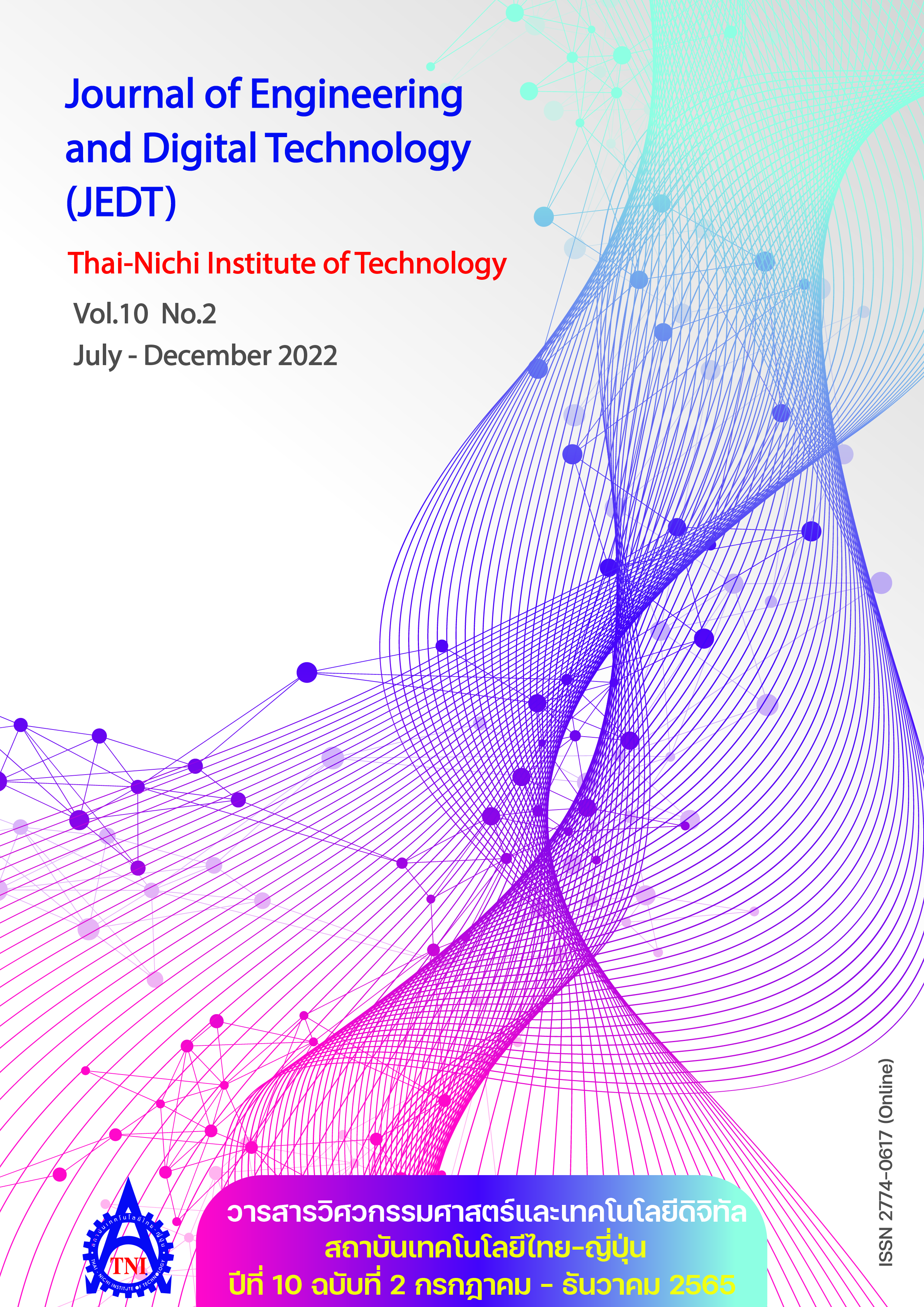Performance Improvement of Tree Algorithm Using Adaptive Splitting Algorithms
Main Article Content
บทคัดย่อ
In this paper, we propose the Adaptive Splitting Type-1 and Adaptive Splitting Type-2 algorithms that can be used in conjunction with the existing tree algorithms. binary tree and ternary tree algorithms divide users involved in a collision into a constant number of groups. Splitting users into a fixed number of groups without taking into account the number of collision-related users results in lower channel utilization. Therefore, the proposed algorithms are designed to improve the performance of tree algorithms by adjusting the number of groups to be split to match the number of users involved in the collision. It can be observed from the results that Adaptive Splitting Type-1 and Adaptive Splitting Type-2 algorithms perform better binary tree and ternary tree algorithms in terms of average delay, which indicates that the proposed algorithms can be used to enhance the efficiency of the tree algorithms. In particular, the Adaptive Splitting Type-2 algorithm offers the best performance.
Article Details

อนุญาตภายใต้เงื่อนไข Creative Commons Attribution-NonCommercial-NoDerivatives 4.0 International License.
นโยบายการรับบทความ
กองบรรณาธิการวารสารสถาบันเทคโนโลยีไทย-ญี่ปุ่น มีความยินดีรับบทความจากอาจารย์ประจำ และผู้ทรงคุณวุฒิในสาขาวิศวกรรมศาสตร์และเทคโนโลยี ที่เขียนเป็นภาษาไทยหรือภาษาอังกฤษ ซึ่งผลงานวิชาการที่ส่งมาขอตีพิมพ์ต้องไม่เคยเผยแพร่ในสิ่งพิมพ์อื่นใดมาก่อน และต้องไม่อยู่ในระหว่างการพิจารณาของวารสารอื่นที่นำส่ง ดังนั้นผู้สนใจที่จะร่วมเผยแพร่ผลงานและความรู้ที่ศึกษามาสามารถนำส่งบทความได้ที่กองบรรณาธิการเพื่อเสนอต่อคณะกรรมการกลั่นกรองบทความพิจารณาจัดพิมพ์ในวารสารต่อไป ทั้งนี้บทความที่สามารถเผยแพร่ได้ประกอบด้วยบทความวิจัย ผู้สนใจสามารถศึกษาและจัดเตรียมบทความจากคำแนะนำสำหรับผู้เขียนบทความ
การละเมิดลิขสิทธิ์ถือเป็นความรับผิดชอบของผู้ส่งบทความโดยตรง บทความที่ได้รับการตีพิมพ์ต้องผ่านการพิจารณากลั่นกรองคุณภาพจากผู้ทรงคุณวุฒิและได้รับความเห็นชอบจากกองบรรณาธิการ
ข้อความที่ปรากฏภายในบทความของแต่ละบทความที่ตีพิมพ์ในวารสารวิชาการเล่มนี้ เป็น ความคิดเห็นส่วนตัวของผู้เขียนแต่ละท่าน ไม่เกี่ยวข้องกับสถาบันเทคโนโลยีไทย-ญี่ปุ่น และคณาจารย์ท่านอื่น ๆ ในสถาบัน แต่อย่างใด ความรับผิดชอบด้านเนื้อหาและการตรวจร่างบทความแต่ละบทความเป็นของผู้เขียนแต่ละท่าน หากมีความผิดพลาดใด ๆ ผู้เขียนแต่ละท่านจะต้องรับผิดชอบบทความของตนเองแต่ผู้เดียว
กองบรรณาธิการขอสงวนสิทธิ์มิให้นำเนื้อหา ทัศนะ หรือข้อคิดเห็นใด ๆ ของบทความในวารสารสถาบันเทคโนโลยีไทย-ญี่ปุ่น ไปเผยแพร่ก่อนได้รับอนุญาตจากผู้นิพนธ์ อย่างเป็นลายลักษณ์อักษร ผลงานที่ได้รับการตีพิมพ์ถือเป็นลิขสิทธิ์ของวารสารสถาบันเทคโนโลยีไทย-ญี่ปุ่น
ผู้ประสงค์จะส่งบทความเพื่อตีพิมพ์ในวารสารวิชาการ สถาบันเทคโนโลยีไทย-ญี่ปุ่น สามารถส่ง Online ที่ https://www.tci-thaijo.org/index.php/TNIJournal/ โปรดสมัครสมาชิก (Register) โดยกรอกรายละเอียดให้ครบถ้วนหากต้องการสอบถามข้อมูลเพิ่มเติมที่
- กองบรรณาธิการ วารสารสถาบันเทคโนโลยีไทย-ญี่ปุ่น
- ฝ่ายวิจัยและนวัตกรรม สถาบันเทคโนโลยีไทย-ญี่ปุ่น
เลขที่ 1771/1 สถาบันเทคโนโลยีไทย-ญี่ปุ่น ซอยพัฒนาการ 37-39 ถนนพัฒนาการ แขวงสวนหลวง เขตสวนหลวง กรุงเทพมหานคร 10250 ติดต่อกับคุณพิมพ์รต พิพัฒนกุล (02) 763-2752 , คุณจุฑามาศ ประสพสันติ์ (02) 763-2600 Ext. 2402 Fax. (02) 763-2754 หรือ E-mail: JEDT@tni.ac.th
เอกสารอ้างอิง
T. Zhang and Q. Zhu, “EVC-TDMA: An enhanced TDMA based cooperative MAC protocol for vehicular networks,” J. Commun. Netw., vol. 22, no. 4, pp. 316–325, Aug. 2020.
J. Lee, H. Noh, and J. Lim, “TDMA-based cooperative MAC protocol for multi-hop relaying networks,” IEEE Commun. Lett., vol. 18, no. 3, pp. 435–438, Mar. 2014.
J. Zhang, L. Yang, L. Hanzo, and H. Gharavi, “Advances in cooperative single-carrier FDMA communications: Beyond LTE-advanced,” IEEE Commun. Surv. Tut., vol. 17, no. 2, pp. 730–756, May 2015.
M. Geles, A. Averbuch, O. Amrani, and D. Ezri, “Performance bounds for maximum likelihood detection of single carrier FDMA,” IEEE Trans. Commun., vol. 60, no. 7, pp. 1945–1952, Jul. 2012.
B. Smida, S. Affes, K. Jamaoui, and P. Mermelstein, “A multicarrier CDMA space–time receiver with full-interference-suppression capabilities,” IEEE Trans. Veh. Technol., vol. 57, no. 1, pp. 363–379, Jan. 2008.
X. Peng, K. Png, Z. Lei, F. Chin, and C. C. Ko, “Two-layer spreading CDMA: An improved method for broadband uplink transmission,” IEEE Trans. Veh. Technol., vol. 57, no. 6, pp. 3563–3577, Nov. 2008.
H. Noh, J. Lee, and J. Lim, “ANC-ALOHA: Analog network coding ALOHA for satellite networks,” IEEE Commun. Lett., vol. 18, no. 6, pp. 957–960, Jun. 2014.
H. Baek, J. Lim, and S. Oh, “Beacon-based slotted ALOHA for wireless networks with large propagation delay,” IEEE Commun. Lett., vol. 17, no. 11, pp. 2196–2199, Nov. 2013.
J. Tong, L. Fu, and Z. Han, “Throughput enhancement of full-duplex CSMA networks using multiplayer bandits,” IEEE Internet Things J., vol. 8, no. 15, pp. 11807–11821, Aug. 2021.
A. Maatouk, M. Assaad, and A. Ephremides, “Energy efficient and throughput optimal CSMA scheme,” IEEE/ACM Trans. Netw., vol. 27, no. 1, pp. 316–329, Feb. 2019.
W. Srichavengsup, K. Kittipeerachon, and C. Thongwan, “Improving the performance of IEEE 802.11 DCF with constant contention window by reducing the wasted time slots,” J. Eng. Digit. Technol. (JEDT), vol. 8, no. 2, pp. 39–47, Dec. 2020.
Y. C. Lai and L. Y. Hsiao, “General binary tree protocol for coping with the capture effect in RFID tag identification,” IEEE Commun. Lett., vol. 14, no. 3, pp. 208–210, Mar. 2010.
A. J. E. M. Janssen and M. J. M. de Jong, “Analysis of contention tree algorithms,” IEEE Trans. Inform. Theory, vol. 46, no. 6, pp. 2163–2172, Sep. 2000.
J. I. Capetanakis, “Tree algorithms for packet broadcast channels,” IEEE Trans. Inform. Theory, vol. 25, no. 5, pp. 505–515, Sep. 1979.
B. S. Tsybakov and B. A. Mikhailov, “Random multiple packet access: Part-and-try algorithm,” Problems Inform. Transmiss., vol. 16, no. 4, pp. 65–79, Oct. 1980.
P. Mathys and P. Flajolet, “Q-ary collision resolution algorithms in random-access systems with free or blocked channel access,” IEEE Trans. Inform. Theory, vol. 31, no. 3, pp. 217–243, Mar. 1985.


